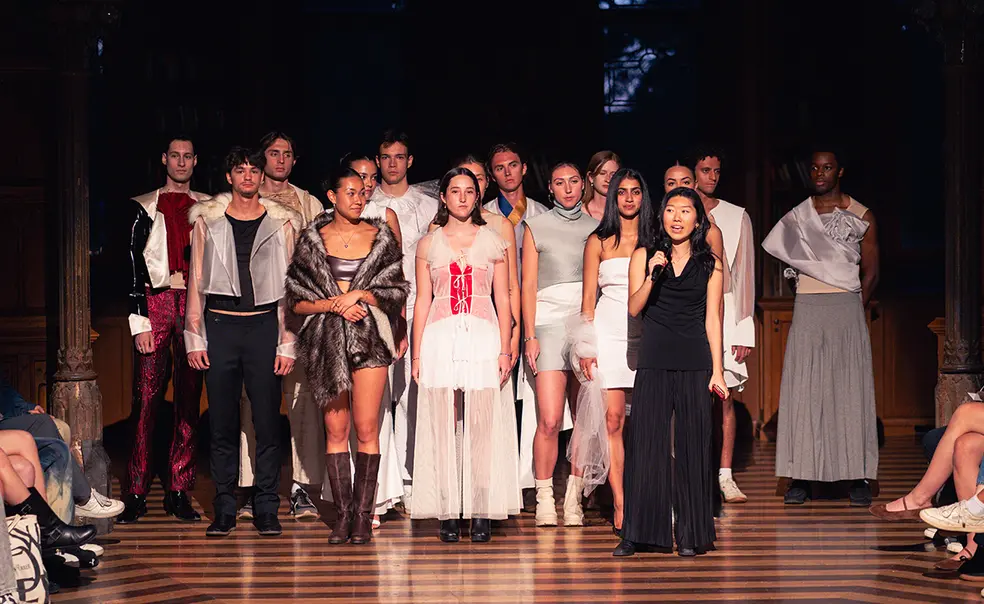Tailoring a Princeton Education to the Pursuit of Fashion
Jeanie Chang ’25 combined her self-taught sewing skills and interdisciplinary Princeton education to create a fashion show for her senior thesis
During my final week at Princeton, while many classmates were preoccupied with exams, Reunions, or graduation, my thoughts were elsewhere. My greatest concern wasn’t academic performance or celebration. It was the execution of a fashion show that was also my senior thesis.
I spent those final weeks in a whirlwind of fittings, fabric sourcing, model coordination, and runway logistics (a far cry from the idealized, unhurried end of spring semester I once envisioned).
The culmination of those long hours and small sacrifices was worth it the night of the show. From the balcony of Chancellor Green, I watched the space transform — stained glass glowing, the air charged with music from the DJ set. I could make out faces in the crowd, focused and engaged, and their quiet attention to each look was deeply affirming. Later that night and into the next day, messages from friends and strangers poured in. For the first time, it felt like others could see what had lived only in my mind for the past year.
My relationship with fashion began in an unlikely setting: the corner of my childhood bedroom during the pandemic. With no formal training, I taught myself to sew using a five-minute YouTube video. That first collection, produced entirely by hand, won the National YoungArts Foundation Design Arts award in 2021. It was a serendipitous moment that made me consider fashion not just as a passion, but as a possible career.
When I arrived at Princeton, I knew I wanted to pursue a life in the arts. While the University doesn’t offer a formal fashion program, its liberal arts education offered something equally valuable: the intellectual freedom to ask questions, pursue creative work on my own terms, and situate practice within theory. These values shaped the evolution of both my academic and artistic journeys.
The summer before senior year, I interned with the luxury handbag brand Anima Iris through the Keller Center’s Princeton Startup Immersion Program (PSIP). Working alongside founder and CEO Wilglory Tanjong ’18 in New York and even traveling to Dakar, I observed how design could operate at the intersection of heritage, entrepreneurship, and global storytelling. That summer affirmed my decision to start my own fashion brand, Genie Couture, and to center my senior thesis around a fully realized runway show.
The final project, titled Metanoilepsis, unfolded as a hybrid thesis: a poetry manuscript, a critical essay, and a 20-look couture collection. In many ways, it represented my attempt to create a total artwork — a synthesis of text, theory, and design.
“Doing fashion” at Princeton presented a number of challenges. Unlike students at dedicated art or design schools, I lacked specialized studio spaces, technical equipment, and a cohort of peers working toward similar creative goals. At times, it felt necessary to justify fashion’s intellectual legitimacy within an academic environment that did not always see it as such.
Yet I was fortunate to find mentorship and institutional support. My thesis advisers, professors Sandra Bermann (comparative literature) and Ilya Kaminsky (creative writing), understood the interdisciplinary ambition of the project. Funding from departments like the comparative literature and East Asian Studies departments and other University resources, in addition to the YoungArts Creative Microgrants Fund, enabled me to conduct field research and production travel across Europe, South Korea, and Romania. And courses like the Humanities Sequence, which I took as a first-year, proved unexpectedly foundational — informing how I approached fashion not merely as design, but as a form of philosophical inquiry and cultural narrative.
Above all, Princeton provided the people. From friends who offered feedback on designs, to students who volunteered as models, to professors who challenged and encouraged my thinking, the community made this project possible. My parents, too, supported me unconditionally. I often think of my parents, then my friends, and Princeton, as my first investors.
Coordinating the runway show was a formidable task, one that required equal parts creativity and logistical precision. It was also a lesson in collaboration, a reminder that even the most personal artistic visions rely on the generosity and labor of many others.
As I prepare to move to New York City to pursue Genie Couture full time, I carry with me the memory of that evening in Chancellor Green, where my thesis came to life in fabric, movement, and light. The enthusiastic response — from peers, professors, and alumni — was a reminder that fashion has the capacity to connect, to provoke thought, and to build community.
Princeton may not be a fashion school, but it has taught me how to think deeply, work independently, and create without precedent. In the absence of a clear path, I was granted the freedom to forge my own — and that is its own kind of education.












No responses yet